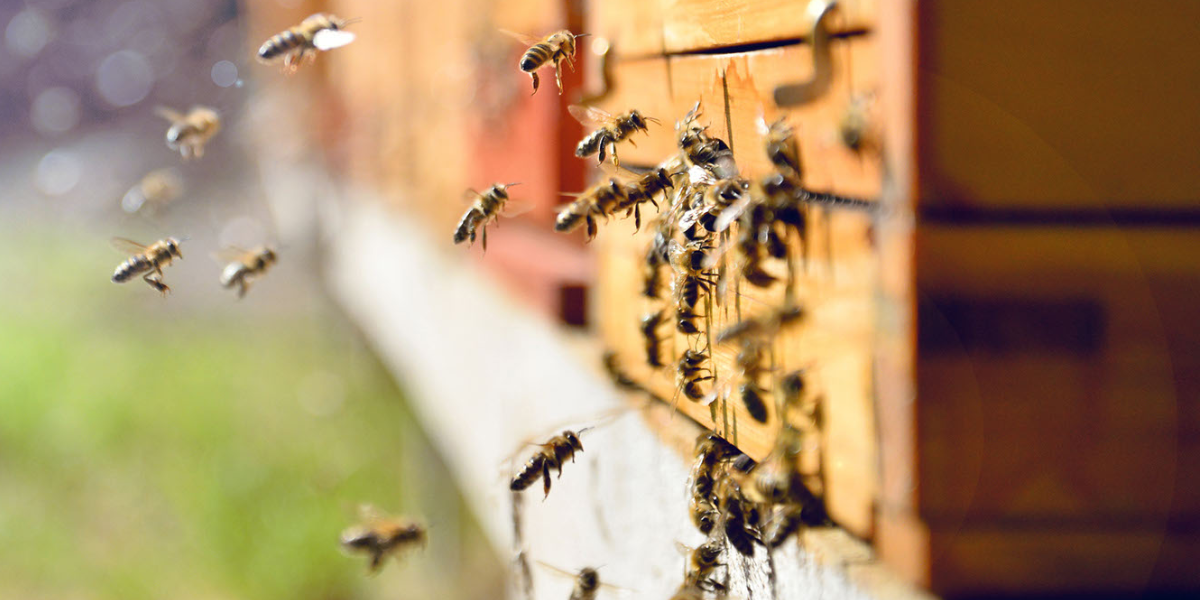As we approach World Bee Day on the 20th of May, beekeepers are reminding us of how vital these pollinators are. We rely on bees not just for our crops, but also for a balanced ecosystem.
In NSW, the major threat that bees face right now is the Varroa Mite, a parasite that has resulted in hundreds of hives being burnt to prevent its spread. Three distinct zones have been set up across the state – 10km eradication red zones, where honeybee hives are required to be euthanised, 25km purple surveillance zones, which are monitored and inspected by officials and the general warning blue zone which covers the remainder of the state.
Currently there is only one eradication and surveillance zone in the New England region, located near Narrabri, and the varroa mite was detected in Coffs Harbour last year.
President of the New England chapter of Amateur Beekeepers Australia, Michael Colvin, explains that while the mite itself isn’t a major threat in the region just yet, beekeepers are still required to survey their hives and report back.
“We’ve all got to check our hives at minimum every sixteen weeks, use an alcohol wash and report that. You’ve got to send your results in, whether they’re positive or negative to the DPI.”
“Thankfully we don’t have any mites here yet, and hopefully we don’t ever get them.”
It’s not just the bees that varroa mites can affect, either. The NSW Department of Industry notes that the emergency response can negatively impact the mental and emotional wellbeing of individuals, as well as their finances. All beekeepers are able to access free and confidential support services through the Department of Industry’s website. Community support can go a long way to helping local beekeepers too.
Michael says that one of the best ways you can support beekeepers is to buy local honey.
“The biggest thing is to buy local honey off local beekeepers because you know its 100% honey, and its not owned by some multinational.”
“Commercial stuff you buy in the supermarkets has been treated to around 75 degrees, which alters the flavour of it, but it stops it from crystallising.”
“One of the biggest things we get is how good our honey tastes. If it crystallises, you know you’ve got good honey.”
It’s not all doom and gloom though. Despite the threats, beekeeping can be a fulfilling hobby, and there are plenty of ways to support native and European bees without having hives of your own.
Michael says that planting flowering plants is one of the best ways you can support bees.
“There’s a lot of resources you can look at, and a lot of autumn and early spring flowering plants in New England are great, because during winter the bees don’t forage much because it’s so cold.”
“Anything that flowers, really, and a lot of your white clover and daisies that flower in grassland and paddocks.”
“If you’re planting a garden, think about when things flower so you’ve got things that flower throughout the year. It’s going to benefit not just honeybees but native bees as well.”
Both native bees and European bees love flowers because they feed on their nectar as well as collecting the pollen. With over 1700 native bee species in Australia, there’s a lot of pollinators that you can help. Aussie Bees has a list of flowers loved by native bees, many of which are also Australian natives. Planting flowers is an easy way to support your local pollinators without having to spend a lot of money, and you don’t need to be a beekeeper to do so.
If you’ve ever thought about getting into beekeeping, Michael suggests you attend a workshop or class before buying your first hive.
“I highly recommend going and doing a course before you actually get your bees. Allan Thomas runs weekend courses through the year.”
“There’s a lot more in it than people think, there’s a lot of management to it. I’d recommend joining our group, do a course, and go from there.”
The New England Amateur Beekeepers Association, which falls under Amateur Beekeepers Australia, has around 100 members spanning from Glen Innes and Warialda, right down to Tamworth. The best way to find them is through the Amateur Beekeepers Australia website. They’ll also have a stand at New England Garden Festival in November.
For those wanting to learn more about the importance of pollinators, researchers from the University of New England and members of the National Parks and Wildlife Service will be giving a series of talks ahead of World Bee Day on Wednesday the 17th of May at the Dorrigo Rainforest Centre. Tickets are free and there are limited spaces, but the talks will be recorded for anyone who misses out in person.
World Bee Day will be observed on the 20th of May, so make sure to thank these busy pollinators for all their hard work.
You can reserve your spot for the joint UNE and National Parks and Wildlife Service talks here: https://www.eventbrite.com.au/e/npws-and-une-celebrating-pollinators-and-plants-morning-session-tickets-625004052947
To learn more about World Bee Day in Australia, you can visit their website, https://www.worldbeeday.org.au/.
You can find Amateur Beekeepers Australia (and the New England club) here, https://www.beekeepers.asn.au.
If you’re interested in Allan Thomas’ beekeeping courses, you can find that information here: http://tamworthbeekeepingsupplies.com.au/info/index.php/courses-in-bees
Like what you’re reading? Support New England Times by making a small contribution today and help us keep delivering local news paywall-free. Donate now


